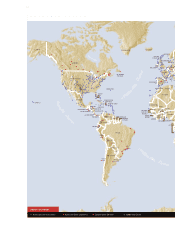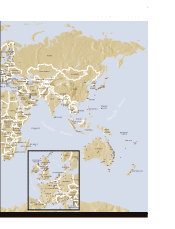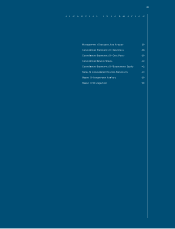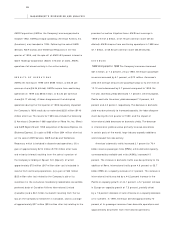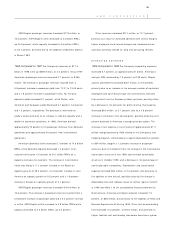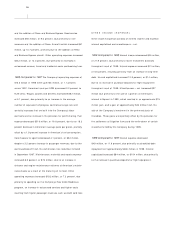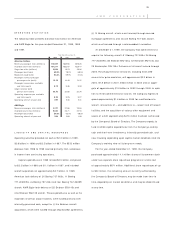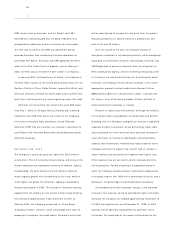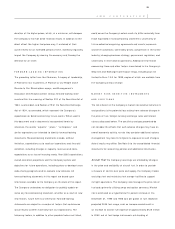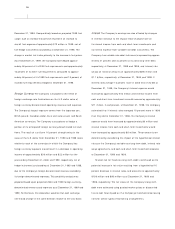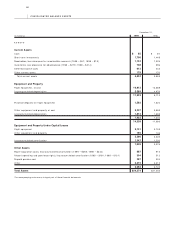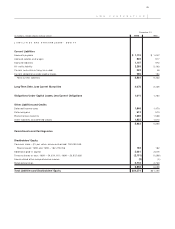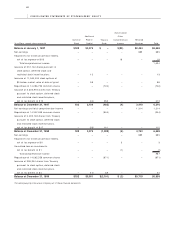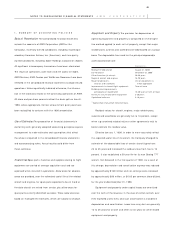American Airlines 1999 Annual Report Download - page 34
Download and view the complete annual report
Please find page 34 of the 1999 American Airlines annual report below. You can navigate through the pages in the report by either clicking on the pages listed below, or by using the keyword search tool below to find specific information within the annual report.
AMR CORPORATION
33
a material impact on its results of operations, financial position
or liquidity. Additional information is included in Note 3 to
the consolidated financial statements.
Year 2000 Project The Company did not experience any signifi-
cant malfunctions or errors in its operating or business systems
on January 1, 2000, and has not since that date. Although it is
possible that the full impact of the date change has not been fully
recognized, the Company believes any such problems are likely
to be minor and correctable. In addition, the Company could still
be negatively affected if its customers or major suppliers are
adversely affected by the Year 2000 or similar issues. However,
the Company is not currently aware of any significant Year 2000
or similar problems that have arisen for its customers or major suppliers.
As of December 31, 1999, the Company’s total cost of the
Year 2000 Project was approximately $214 million. Costs associ-
ated with the Year 2000 Project were expensed as incurred, other
than capitalized hardware costs, and were funded through cash
from operations.
Dallas Love Field In 1968, as part of an agreement between the
cities of Fort Worth and Dallas to build and operate Dallas/Fort
Worth Airport (DFW), a bond ordinance was enacted by both
cities (the Bond Ordinance). The Bond Ordinance required both
cities to direct all scheduled interstate passenger operations to
DFW and was an integral part of the bonds issued for the
construction and operation of DFW. In 1979, as part of a settle-
ment to resolve litigation with Southwest Airlines, the cities
agreed to expand the scope of operations allowed under the
Bond Ordinance at Dallas’ Love Field. Congress enacted the
Wright Amendment to prevent the federal government from
acting inconsistent with this agreement. The Wright Amendment
limited interstate operations at Love Field to the four states
contiguous to Texas (New Mexico, Oklahoma, Arkansas, and
Louisiana) and prohibited through ticketing to any destination
outside that perimeter. In 1997, without the consent of either
city, Congress amended the Wright Amendment by (i) adding
three states (Kansas, Mississippi, and Alabama) to the perimeter
and (ii) removing some federal restrictions on large aircraft
configured with 56 seats or less (the 1997 Amendment).
In October 1997, the City of Fort Worth filed suit in state
district court against the City of Dallas and others seeking to
enforce the Bond Ordinance. Fort Worth contends that the 1997
Amendment does not preclude the City of Dallas from exercising
its proprietary rights to restrict traffic at Love Field in a manner
consistent with the Bond Ordinance and, moreover, that Dallas
has an obligation to do so. American joined in this litigation. On
October 15, 1998, the state district court granted summary
judgment in favor of Fort Worth and American, which summary
judgment is being appealed to the Fort Worth Court of Appeals.
In the same lawsuit, DFW filed claims alleging that irrespective
of whether the Bond Ordinance is enforceable, the DFW Use
Agreement prohibits American and other DFW signatory airlines
from moving any interstate operations to Love Field. These
claims remain unresolved.
Dallas filed a separate declaratory judgment action in the
United States District Court for the Northern District of Texas,
Dallas Division, seeking to have the court declare that, as a
matter of law, the 1997 Amendment precludes Dallas from exer-
cising any restrictions on operations at Love Field. Further, in May
1998, Continental Airlines and Continental Express filed a lawsuit
in Dallas federal court seeking a judicial declaration that the Bond
Ordinance cannot be enforced to prevent them from operating
flights from Love Field to Cleveland using regional jets. These two
federal court lawsuits were consolidated and stayed.
In December 1998, the Department of Transportation (DOT)
issued an order on the federal law questions concerning the Bond
Ordinance, local proprietary powers, DFW’s Use Agreement with




